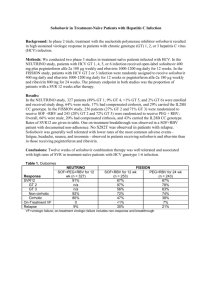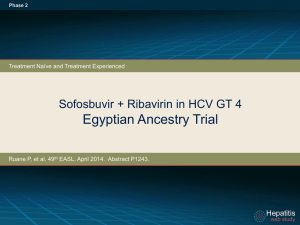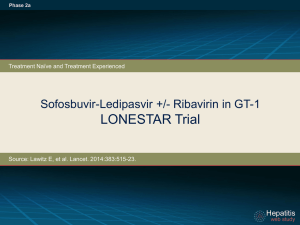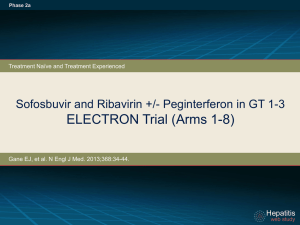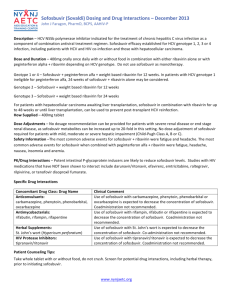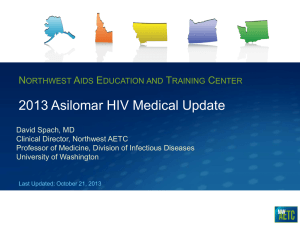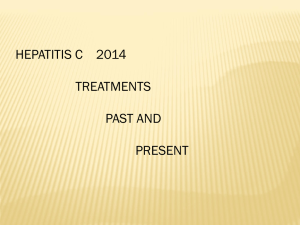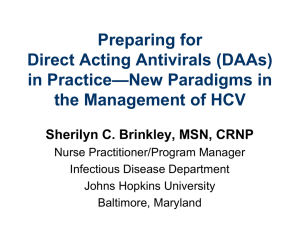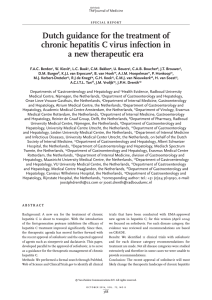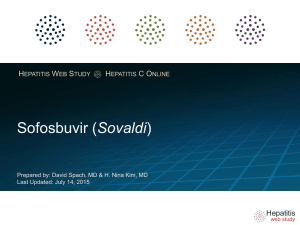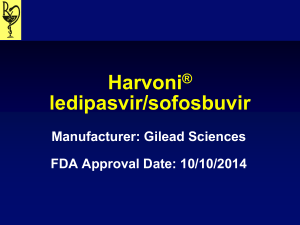HIV HCV HBV - What`s New in Medicine
advertisement
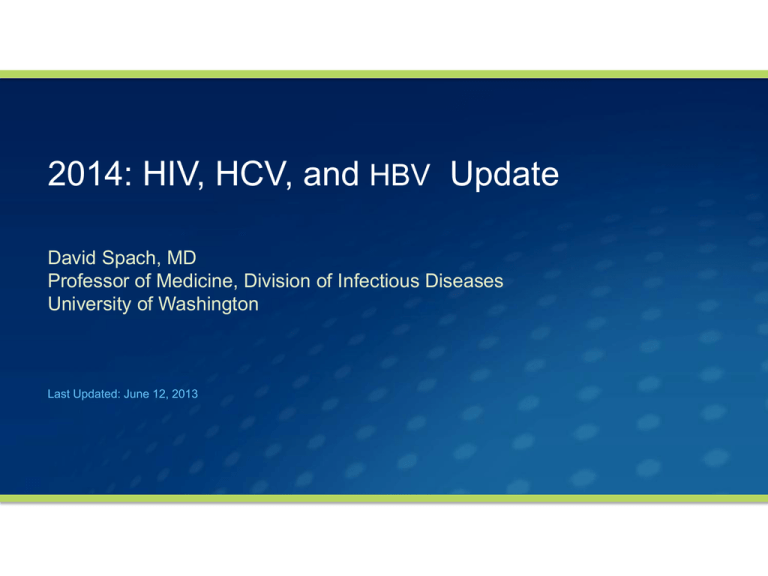
2014: HIV, HCV, and HBV Update David Spach, MD Professor of Medicine, Division of Infectious Diseases University of Washington Last Updated: June 12, 2013 Chronic Viral Diseases and Mortality in United States • Which one of the chronic viral diseases was responsible for the most number of deaths in the United States in 2007? A. Hepatitis A virus B. Hepatitis B virus C. Hepatitis C virus D. HIV Age-Adjusted Mortality Rates from HBV, HCV, & HIV United States, 1999-2007 7 HIV Rate per 100,000 PY 6 5 4 Hepatitis C 3 2 1 Hepatitis B 0 1999 2000 2001 2002 2003 Year Source: Ly KN, et al. Ann Intern Med. 2012:156:271-8. 2004 2005 2006 2007 Forecasted 2010-2060 Annual HCV-Related Deaths in the United States Persons with Chronic Hepatitis C and no Cirrhosis in 2005 45,000 Peak 40,000 Deaths 35,000 Number 30,000 25,000 20,000 15,000 10,000 5,000 0 2010 2014 2018 2022 2026 2030 2034 2038 2042 2046 2050 2054 2058 Year Source: Rein DR, et al. Dig Liver Dis. 2011:43:66-72. Hepatitis C Update Hepatitis C: Progression of Disease Time 20-25 years Normal Liver 25-30 years Chronic Hepatitis Cirrhosis HCC ESLD Death HCV Infection Comparative Treatment Goals with Antiviral Therapy HIV HBV HCV (latent reservoir) (latent reservoir) (no latent reservoir) HCV RNA ccDNA Proviral DNA Host DNA Host DNA Host DNA Host Cell Host Cell Host Cell Lifelong suppression of viral replication Long-term reduction of viral replication Source: Kieffer TA, et al. J Antimicrob Chemother. 2010:65:2012-12 Definitive Viral Clearance Virologic Responses with HCV Therapy Sustained Virologic Response (SVR12) 10,000,000 Treatment Post Treatment HCV RNA IU/ml 1,000,000 SVR12 100,000 10,000 End of Treatment 1,000 12 Weeks 100 10 1 Undetectable -8 -4 0 4 8 12 16 20 24 28 32 36 40 44 Treatment Week Sustained Virologic Response (SVR12) = Undetectable HCV RNA 12 Weeks Post Treatment 48 Evolution of Hepatitis C Treatment • In 2015, what is the realistic expectation for achieving SVR (cure) of hepatitis C with state-of-the-art treatment? A. 60% B. 75% C. 85% D. 95% Therapy for Hepatitis C: Historical Milestones Sustained Virologic Response (%) 100 Timeline 1986 1998 2001 2002 2011 80 70 60 55 42 40 34 39 16 20 6 0 IFN 6m IFN 12m IFN + RBV 6m IFN + RBV 12m PegIFN 12m PegIFN + RBV 12m PegIFN + RBV + PI 612m Therapy for Hepatitis C SVR Rates with DAA-Based Therapy Timeline 1986 1998 2001 2002 2011 Sustained Virologic Response (%) 100 2014 90 80 70 55 60 42 40 34 39 16 20 6 0 IFN 6m IFN 12m IFN + RBV IFN + RBV 6m 12m PEG 12m PEG + RBV 12m PEG + RBV + PI 6-12m Multiple DAAs 3m Therapy for Hepatitis C SVR Rates with Multiple DAAs Timeline 1986 1998 2001 2002 2011 2014 2015 Sustained Virologic Response (%) 100 97 90 80 70 60 55 40 42 34 39 20 0 6 IFN 6m 16 IFN 12m IFN + RBV 6m IFN + RBV 12m PEG 12m PEG + RBV PEG + RBV PEG + RBV 12m + PI + SOF 6-12m 3m Multiple DAAs 2-3m Hepatitis C Virus Structural and Nonstructural Proteins Hepatitis C Proteins Structural Proteins C E1 E2 Nonstructural (NS) Proteins p7 NS2 Cysteine Protease Vioporin NS4 A NS3 NS4B Serine Protease Cofactors Serine RNA Protease Helicase NS5A NS5B RNA binding and assembly recognition complex Membranous Web Induction RNA-Dependent RNA Polymerase Categories of Direct Acting Antiviral Agents Hepatitis C Direct Acting Antiviral Agent (DAA) Categories NS3/4A Protease Inhibitor NS5A Inhibitor NS5B Polymerase Inhibitor NS3 NS4A NS5A NS5B Serine Protease Cofactors RNA binding and assembly recognition complex RNA-Dependent RNA Polymerase Serine Protease Future HCV Direct Acting Agents (DAAs) NS3 NS5A NS5B Protease Inhibitors NS5A Inhibitors Polymerase Inhibitors Asunaprevir Daclatasvir Mericitabine Danoprevir Ledipasvir Sofosbuvir Faldaprevir Ombitasvir Dasabuvir Simeprevir IDX-719 BMS-791325 NS4A Vaniprevir ABT-450/r BI-207127 Sofosbuvir + PEG + RBV: Treatment-Naive HCV GT 1,4,5,6 NEUTRINO Trial: Design Week N =327 0 12 Sofosbuvir + PEG + RBV 24 SVR12 Drug Dosing Sofosbuvir: 400 mg once daily Peginterferon alfa-2a: 180 µg once weekly Ribavirin (weight-based and in 2 divided doses): 1000 mg/day if < 75 kg or 1200 mg/day if ≥ 75 kg Source: Lawitz E, et al. N Engl J Med. 2013;368:1878-87. Sofosbuvir + PEG + RBV: Treatment-Naive HCV GT 1,4,5,6 NEUTRINO Trial: Results NUTRINO: SVR 12 by Genotype Patients with SVR 12 (%) 100 80 89 97 92 82 60 40 20 261/292 206/225 54/66 34/35 GT 1 (all subtypes) GT 1a GT 1b GT 4,5,6 0 GT = genotype Source: Lawitz E, et al. N Engl J Med. 2013;368:1878-87. Hepatitis C Treatment • According to 2014 AASLD/IDSA/IAS-USA guidance, which on of the following regimens is recommended for initial treatment of patients with genotype 1 chronic HCV? Assume the patient is eligible to receive interferon. A. Peginterferon + Ribavirin + Telaprevir x 12 weeks B. Peginterferon + Ribavirin + Sofosbuvir x 12 weeks C. Peginterferon + Ribavirin + Sofosbuvir x 12 weeks D. Sofosbuvir + Simeprevir x 24 weeks AASLD/IDSA/IAS-USA 2014 HCV Treatment Recommendations Initial Recommended Therapy for Patients with Chronic HCV HCV: Recommended Initial Treatment & Retreatment of Relapsers* Interferon Eligible GT1 Sofosbuvir + Peginterferon + Ribavirin x 12 weeks Not Interferon Eligible Sofosbuvir + Simeprevir +/- Ribavirin x 12 weeks GT2 Sofosbuvir + Ribavirin x 12 weeks GT3 Sofosbuvir + Ribavirin x 24 weeks Interferon Eligible GT4 Sofosbuvir + Peginterferon + Ribavirin x 12 weeks Not Interferon Eligible Sofosbuvir + Ribavirin x 24 weeks *Patients who experienced relapse after Peginterferon plus Ribavirin therapy Source: AASLD/IDSA/IAS-USA (www.hcvguidelines.org). Hepatitis C Genotype 1 Costs of Different Regimens for Treatment of Genotype 1 Estimated Medication Cost for Treatment of Genotype 1 Chronic HCV Regimen and Duration Regimen Cost Sofosbuvir + Ribavirin + Peginterferon x 12 weeks $97,000 Sofosbuvir x 12 weeks + [Ribavirin + Peginterferon] x 24 weeks $109,000 Sofosbuvir + Ribavirin x 24 weeks $169,000 Sofosbuvir + Simeprevir +/- Ribavirin x 12 weeks $150,000 Simeprevir x 12 weeks + [Ribavirin + Peginterferon] x 24 weeks $79,000 Simeprevir x 12 weeks + [Ribavirin + Peginterferon] x 48 weeks $104,000 Note: sofosbuvir cost = $1000 per day of treatment INVESTIGATIONAL Ledipasvir-Sofosbuvir +/- Ribavirin in Treatment-Naïve HCV GT 1 ION-1 Study: Study Design Week 0 12 24 36 n = 214 LDV-SOF SVR12 n = 217 LDV-SOF + RBV SVR12 n = 217 LDV-SOF SVR12 n = 217 LDV-SOF + RBV SVR12 GT-1 Naive GT-1 Naive Drug Dosing Ledipasvir-sofosbuvir (90/400 mg): fixed dose combination; one pill once daily N =14 Ribavirin (weight-based and divided bid): 1000 mg/day if < 75 kg or 1200 mg/day if ≥ 75 kg Abbreviations: LDV= ledipasvir; SOF = sofosbuvir; RBV = ribavirin Source: Afdhal N, et al. N Engl J Med. 2014;370:1889-98. INVESTIGATIONAL Ledipasvir-Sofosbuvir +/- Ribavirin in Treatment-Naïve HCV GT 1 ION-1 Study: Results ION-1: SVR 12 by Treatment Duration and Regimen Patients with SVR 12 (%) 100 99 97 98 99 211/214 211/217 212/217 215/217 LDV-SOF LDV-SOF +RBV LDV-SOF LDV-SOF + RBV 80 60 40 20 0 12-Week Regimen LDV= ledipasvir; SOF = sofosbuvir; RBV = ribavirin Source: Afdhal N, et al. N Engl J Med. 2014;370:1889-98. 24-Week Regimen INVESTIGATIONAL Ledipasvir-Sofosbuvir +/- Ribavirin in Treatment-Naïve HCV GT 1 ION-1 Study: Results ION-1: SVR12 by Treatment Regimen and Liver Disease Without Cirrhosis Patients (%) with SVR 12 100 100 97 100 100 99 97 178/178 33/33 181/182 31/32 With Cirrhosis 100 100 179/179 36/36 80 60 40 20 179/179 32/33 0 LDV-SOF LDV-SOF + RBV 12-Week Treatment LDV-SOF 24-Week Treatment Note: subgroup results do not include patients who withdrew consent or were lost to follow-up Source: Afdhal N, et al. N Engl J Med. 2014;370:1889-98. LDV-SOF + RBV INVESTIGATIONAL 3D (ABT-450/r-Ombitasvir + Dasabuvir) + Ribavirin GT 1 and Compensated Cirrhosis: TURQUOISE-II Study TURQUOISE II: SVR12 12-Week Group 24-Week Group Patients (%) with SVR 12 100 92 96 80 94 99 100 89 60 40 20 0 Overall GT1a Source: Poordad F, et al. N Engl J Med. 2014;370:1973-82. GT1b HCV Treatment: Key Concepts • Very high SVR rates with new therapies • Excellent SVR rates regardless of cirrhosis, race • Excellent SVR rates in treatment experienced • Genotype 3 is most difficult to treat • All oral therapies wave of future • Cost of new therapies is huge barrier University of Washington: Hepatitis C Online Hepatitis C Online: www.hepatitisc.uw.edu HIV Update New HIV Testing Recommendations HIV Testing • Which one of the following best describes the initial recommended HIV screening test in the 2014 CDC recommendations? A. 4th generation p24 antigen-antibody assay B. Western blot C. HIV RNA Traditional Approach to HIV Diagnostic Testing Initial Supplemental EIA Western blot or IFA Optimized for Sensitivity Optimized for Specificity Drawbacks with Conventional HIV Diagnostic Algorithm • Does not detect acute HIV • Does not differentiate HIV-1 and HIV-2 • Problems with indeterminate Western blot Laboratory Diagnosis of Early HIV Infection 30 1,000,000 25 HIV Antibody 100,000 10,000 20 HIV RNA 1,000 100 15 10 1 HIV p24 antigen 0 5 10 15 20 25 30 35 40 Days following HIV Acquisition Timing of HIV RNA, HIV p24 antigen, and HIV Antibody 45 50 10 Antibody Titer HIV RNA (copies/ml) 10,000,000 4th Generation HIV Ag/Ab Combination Assays HIV p24 Antigen HIV Antibodies Detects HIV-1 p24 antigen and antibodies to HIV-1 and HIV-2 2014 CDC Recommendations Recommended Laboraatory HIV Testing Algorithm HIV-1/2 Antigen/Antibody Combination Immunoassay (-) (+) Negative for HIV-1 and HIV-2 antibodies and p24 Ag HIV-1/HIV-2 Ab Differentiation Immunoassay HIV-1 (+) HIV-2 (-) HIV-1 antibodies detected HIV-1 (-) HIV-2 (+) HIV-1 (+) HIV-2 (+) HIV-2 antibodies detected HIV antibodies detected HIV-1 (-) or Indeterminate HIV-2 (-) HIV-1 NAT HIV-1 NAT (+) HIV-1 NAT (-) Acute HIV-1 infection Negative for HIV-1 Source: Centers for Disease Control and Prevention. 2014. Antiretroviral Therapy US Health and Human Services (HHS) May 1, 2014 Antiretroviral Therapy Guidelines Source: 2014 HHS Antiretroviral Therapy Guidelines. AIDS Info (www.aidsinfo.nih.gov) HHS Antiretroviral Therapy Guidelines: 2013 Initiating Therapy in Treatment-Naïve Patients CD4 Cell Count 1000 Antiretroviral therapy (ART) is recommended for all HIV-infected individuals to reduce the risk of disease progression. 800 Recommend (BIII) 600 500 Strongly Recommend (AII) 400 350 200 Strongly Recommend (AI) 0 Source: 2013 HHS Antiretroviral Therapy Guidelines. AIDS Info (www.aidsinfo.nih.gov) HIV Prevention Trials Network (HPTN) Study 052 1,763 HIV Serodiscordant Couples (97% heterosexual) - + n = 873 Source: Cohen M, et al. N Engl J Med. 2011;36:493-505. + n = 890 - HIV Prevention Trials Network (HPTN) Study 052 CD4 Cell Count 1000 800 + + 600 550 Early Therapy 400 200 CD4 350-550 cells/mm3 350 Deferred Therapy CD4 < 250 cells/mm3 or AIDS Related Event 0 Source: Cohen M, et al. N Engl J Med. 2011;36:493-505. 250 HIV Prevention Trials Network (HPTN) Study 052 96% Reduction P < 0.001 1 Early Therapy 27 Deferred Therapy 0 5 10 15 20 Linked Transmissions Source: Cohen M, et al. N Engl J Med. 2011;36:493-505. 25 30 HHS Antiretroviral Therapy Guidelines: May 1, 2014 Recommended Regimens Regardless of Baseline HIV RNA or CD4 Count Class Therapy NNRTI-Based Efavirenz-Tenofovir-Emtricitabine Pill Burden Atazanavir + Ritonavir + Tenofovir-Emtricitabine PI-Based Darunavir + Ritonavir + Tenofovir-Emtricitabine Raltegravir + Tenofovir-Emtricitabine ^Elvitegravir-Cobicistat-Tenofovir-Emtricitabine INSTI-Based Dolutegravir + *Abacavir-Lamivudine Dolutegravir + Tenofovir-Emtricitabine ^Elvitegravir-Cobicistat-Tenofovir-Emtricitabine: only for patients with pre-ART CrCl ≥ 70 ml/min *Abacavir recommended only if HLA-B5701 negative Source: 2014 HHS Antiretroviral Therapy Guidelines. AIDS Info (www.aidsinfo.nih.gov) Single Tablet Antiretroviral Regimens Efavirenz-Tenofovir-Emtricitabine Atripla Rilpivirine-Tenofovir-Emtricitabine Complera Elvitegravir-Cobicistat-Tenofovir-Emtricitabine Stribild Dolutegravir Phase 3 Studies in Treatment-Naïve Subjects Study 1 SPRING-2 2 SINGLE 3 FLAMINGO • ARV History Comparison Results ARV-Naïve Dolutegravir QD versus Raltegravir • Non-inferior ARV-Naïve Dolutegravir QD versus Efavirenz • Dolutegravir superior ARV-Naïve Dolutegravir QD versus Darunavir-RTV • Dolutegravir superior 1 Raffi F, et al. Lancet 2013;381:735-43. 2 Walmsley S. N Engl J Med. 2013:369:1807-18. 3 Clotet B, et al. Lancet. 2014 March 31 [Epub ahead of print] . (88% versus 85%) (88% versus 81%) (90% versus 83%) Future Single Tablet Regimen Dolutegravir-Abacavir-Lamivudine “Tri Pill” Occupational PEP 2013 Source: Kuhar DT, et al. Infect Control Hosp Epidemiol. 2013;34:875-92. Case History HIV Exposure in a Health Care Worker • A 41-year-old male nurse has a needlestick injury on his left thumb. The site bled for about 2 minutes after the injury. The source patient has documented HIV infection, has never taken antiretroviral medications, and most lab studies showed HIV RNA level of 2,350 copies/ml and CD4 count of 658 cells/mm3. • Based on USPHS 2013 Guidelines, what is recommended? A. 2 drugs: Zidovudine-lamivudine B. 2 drugs: Tenofovir-emtricitabine C. 3 drugs: Tenofovir-emtricitabine + Raltegravir D. 3 drugs: Tenofovir-emtricitabine + Darunavir + ritonavir 2013 USPHS Occupational PEP Guidelines Number of Antiretroviral Medications to Use “…the PHS working group recommends prescribing 3 (or more) tolerable drugs as PEP for all occupational exposures to HIV.” Source: Kuhar DT, et al. Infect Control Hosp Epidemiol. 2013;34:875-92. 2013 USPHS Occupational PEP Guidelines Recommendations for Antiretroviral Regimens Recommended Antiretroviral Regimens for Occupational PEP (28-Day Duration) Preferred Regimen INSTI NNRTI Raltegravir (Isentress) Tenofovir-Emtricitabine (Truvada) 400 mg twice daily 1 pill daily Source: Kuhar DT, et al. Infect Control Hosp Epidemiol. 2013;34:875-92. Pill Burden Post-Exposure Prophylaxis Line (PEPline) 888-448-4911 HBV Update HBV Treatment and Entecavir Resistancne • What percentage of patients with chronic HBV and long term entecavir treatment will develop resistance? Resistance with Entecavir • 222 nucleoside-naïve patients treated for 3 years - Cumulative -resistance to entecavir of 1.3% at 3 years Yuen MF, et al. Am J Gastroenterol. 2011;106:1264-71. • 474 nucleoside-naïve treated for 4 years - Cumulative resistance to entecavir of 0.4% Ono A, et al. J Hepatol. 2012;57:508. • Overall Estimates of Resistance Rates - Treatment naïve: < 1% at 5 years - Prior lamivudine failure: approximately 50% at 5 years Duration of HBV Therapy with Entecavir • Can you stop entecavir after long-term treatment (> 2 years) for patients with HBeAg- chronic HBV and HBeAgand sustained virologic suppression? Duration of HBV Therapy with Entecavir • Background - 184 patients with HBeAg- chronic HBV - On entecavir for ≥ 2 years - Undetectable HBV DNA on ≥3 occasions 6 months apart • Following Entecavir Cessation - Virologic relapse at 24 weeks: 74% - Virologic relapse at 48 weeks: 91% “…therapy should be continued indefinitely until the recognised treatment endpoint of HBsAg seroclearance.” Source: Seto WK, et al. Gut. 2014; May 15 [E pub Ahead of Print]
